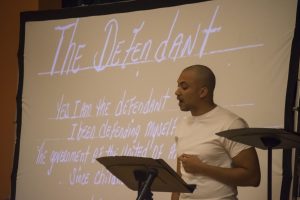Rebecca Andrews
Copy Desk Chief
[email protected]
REVIEW
Eleven men, each having spent more than a decade on death row in an Arkansas state prison, received an unprecedented opportunity to have their unique voices heard through the Prison Story Project in 2016.

Several states away and two years later, these men were represented by six actors who performed their words in a production of On the Row at the Dr. Wesley T. Grant Sr. Southside Center.
The actors first shuffle into the theater singing “Wade in the Water” before solemnly taking the stage. The set is simple — just six music stands for the actors to rest their notebooks on and a projector which shows images of handwritten letters and displays the titles of each written piece.
This stark presentation allows for the inmates’ words to be the focal point of the actors’ performance. The delivery feels personal and harrowing, bringing to mind the unadorned nature of life in solitary confinement.
All actors wear a cotton T-shirt and pants, the standard uniform for Arkansas prisoners. These uniforms are all white, save for two of the actors who wear black T-shirts in memoriam for two Prison Story participants, Jack Jones and Kenneth Williams, who were executed in April of 2017.
Without preamble, the play begins detailing the story of their execution. As a result of the governor’s effort to “clean up death row,” eight inmates were scheduled for execution in a period of 10 days. The governor signed off on it February 2017, said David Joliffe, professor of English and volunteer writing assistant. Four of these inmates were writers with the Prison Story Project. While two were able to get stays, two were killed by the state in April.
A pause was given for the audience to consider this loss, to equate the taking of human life to a clean up makes these men out to be just dirt clogging up the system. This dehumanization is exactly what makes plays such as this so salient, since it becomes all too easy to write off convicts as less than.
It took some time to convince the inmates of the importance of their words. The actors read excerpts from their original letters to Kathy McGregor, the program director, giving various reasons why they declined to participate. Some felt it could compromise their appeals, others did not consider themselves to be writers. One simply could not see the value.
“I’m not sure of how my story could help you or anyone,” his letter read.
Despite this initial reluctance, once the participants accepted the program they took to it with a zeal many students outside prison lack.
“They are dying for mental stimulation and tend to be the best readers,” Joliffe said.
Each class they were given a poem or piece of prose and a corresponding prompt to respond to. Matt Henriksen, the creative writing director, collected these works and combined them to create the material for the staged readings.
“We didn’t change one word of it,” McGregor said. “Everything you hear tonight was written by the men on death row.”
Some prompts seem light hearted, such as “What do you miss?” but carry much deeper meaning for a prisoner. Their answers ranged from the predictable — unlocked windows, fresh air, steak dinners — to the unexpected — pockets and pocket change. One inmate described the sensation of putting his hand in his pocket and feeling coins between his fingers as a comfort he never thought he would miss.
Other prompts ask them to explore what it means to be a defendant, condemned, or faced with injustice. They were asked to consider questions of responsibility, blame and penance. Even though these are writings of men supposedly deemed the lowest of the low, their work reveals them to be far more insightful and shrewd than many of us who walk free today.
Although many of these men may not have more than a high school education, they are not ignorant, especially not to their own reality. One inmate took the opportunity to level his criticisms of the justice system through prose.
“The death penalty is the code name that is mostly used now to describe the atrocity,” he wrote. “To some, to the naive just because they can not see strange fruit literally dangling from the tree. I am the new era of strange fruit minus the sycamore tree and if you open your eyes, the reality you will see.”
Of the project participants seven are African American, two are disabled and one was a veteran, all populations heavily disadvantaged in American society and especially in the justice system. While McGregor makes it clear creating and curating art, not activism, serves as the primary purpose of their organization, she acknowledges the faults in the death penalty system, using the example of one of the death row inmates who was exonerated.
“As long as it is that fallible, as long as we can make a mistake and kill innocent people, we have to start thinking about this in a different way,” McGregor said.
The first step in thinking differently about convicts may be understanding their position, something the play accomplishes fully. By the end, the line between the actors and the inmates faded to a point where it became easy to forget they were not telling their own stories, but those of men they had never met, a testament not only to the actors’ abilities but to the raw and honest nature of the material they were given by the prisoners to portray.
Had the inmates not taken their assignments seriously or not written as openly, the play would fall flat. However, it seems people with nothing but time to lose tend toward candid and meaningful expression, enabling the actors to embody them with poignant accuracy.
The production was brought to Asheville with the help of UNC Asheville’s Honors Director Patrick Bahls. The performance was originally intended to be in tandem with Michelle Alexander’s visit in January but was canceled due to inclement weather.
Local actors were auditioned to participate, including three UNCA students: Robert Simmons, Elijah York and Bjorn Goller-Hagood. The other three actors were Damian Davis, Caleb Owolabi, and Joliffe himself.
A play like this goes beyond the phenomenal performance of the actors or even the art created by the inmates; it serves to give narrative to a population of people often forgotten.
“It humanizes the people whose stories are being told,” Bahls said. “It puts a human face on an institution.”
The play gives a voice to those who have arguably had the most time to consider their position in society but been given the least amount of autonomy to express it. The inmates considered this their one-in-a-million chance to speak out.
“To be seen as humans instead of the animals we are made out to be,” one inmate wrote. “This is an opportunity to be seen as humans, to be understood, to be heard. This is a blessing.”





















